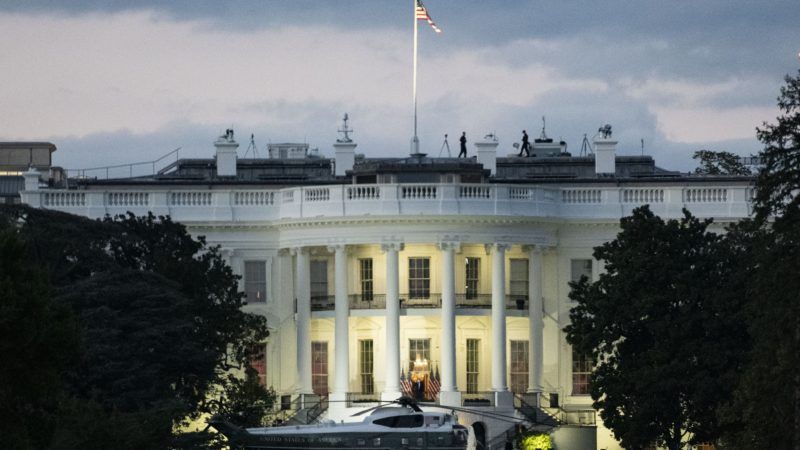No Stimulus Before the Election, Trump Says, but Expect More Spending No Matter Who Wins
It is an abrupt reversal for Trump, who as recently as Saturday had voiced his support for another stimulus package.

President Donald Trump announced Tuesday that he was cutting off negotiations with Congress on a new coronavirus stimulus bill until after November's election—but you can expect the federal government to hike spending once more after the election, no matter who wins.
It's an abrupt reversal for Trump, who as recently as Saturday had voiced his support for another stimulus package. Treasury Secretary Steve Mnuchin and Speaker of the House Nancy Pelosi (D–Calif.) have spent the past few weeks negotiating the specifics of the proposed package, which follows more than $3.7 trillion in emergency spending approved since March.
In a series of tweets on Tuesday afternoon, Trump said he was asking his negotiators to stand down. Removing the stimulus bill from Congress' preelection agenda will clear the deck for the Senate to focus on confirming Amy Coney Barrett to the Supreme Court, something Trump urged Senate Majority Leader Mitch McConnell (R–Ky.) to do.
Nancy Pelosi is asking for $2.4 Trillion Dollars to bailout poorly run, high crime, Democrat States, money that is in no way related to COVID-19. We made a very generous offer of $1.6 Trillion Dollars and, as usual, she is not negotiating in good faith. I am rejecting their…
— Donald J. Trump (@realDonaldTrump) October 6, 2020
But Trump's gambit regarding the stimulus bill is an interesting one. On one hand, he's absolutely correct to object to a federal bailout of states. Most states are facing smaller coronavirus-related budget holes than previously expected, and every state should be responsible for its own fiscal condition. It doesn't make sense for the deeply indebted federal government to take on any additional borrowing to help states.
On the other hand, Trump's announcement does not seem to be motivated by a desire for fiscal restraint. Promising a major stimulus after the election—while simultaneously arguing that "the economy is doing very well" sends mixed messages, to say the least.
It also commits the administration to supporting at least $1.6 trillion in new coronavirus spending. If Democratic nominee Joe Biden wins the presidential race and Democrats take the Senate, expect that number to be significantly higher.
Like so much else about the intersection of COVID-19 and the election, Trump's hands are tied by mistakes that were made months ago. Congress passed, and Trump signed, the largest stimulus package in U.S. history just a few months ago.
If that money had been spent more wisely—and The Washington Post has a useful infographic showing how much of it wasn't—perhaps things would be different now. If the economic lockdowns had been handled differently, or if Trump hadn't helped politicize basic public health measures like mask-wearing, maybe the virus would no longer be wreaking as much havoc on the economy. If Republicans hadn't spent four years completely abandoning any interest in fiscal restraint, perhaps the country would be in a better position to take on the debt necessary to confront this mess.
As it stands, however, Democrats are on the front foot when it comes to both the election and the question of how much money to spend. Their answer is "more" and Trump's delay tactics won't do much to prevent the inevitable.


Show Comments (147)